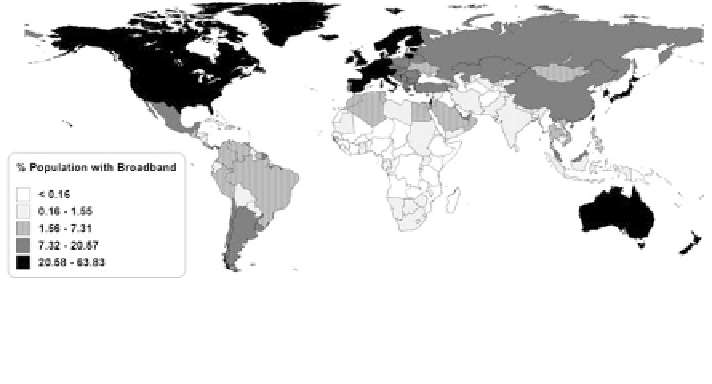Geography Reference
In-Depth Information
Fig. 2.8 Map of broadband penetration per 100 inhabitants, 2010. Source International
Telecommunications Union. Note Because an Internet subscription may be shared by many
people, the penetration rate will not reflect the actual level of access to broadband Internet of the
population
telephony. With large, graphics-intensive files at the heart of most internet uses
today (e.g., downloading forms, reading on-line newspapers), broadband has
become increasingly imperative for Web browsing. However, the geography of
broadband access replicates the globe's geographies of wealth and power—it is
largely confined to the economically developed world. There are strong reasons to
believe that far from eliminating the digital divide, broadband reproduces it, gives
it new form, and in some cases, accentuates it.
Claims that access to the internet is readily available to all, and therefore its
effects cannot help but be beneficial and democratic, must be viewed with great
skepticism. Technologies, including telecommunications, are never socially or
spatially neutral in their impacts. There is a persistent and continuing need to link
the understanding of cyberspace with very real spaces of class and power. All the
existing social categories of wealth and power are replicated in cyberspace, at least
in terms of access to the equipment and technical know-how necessary to gain
entree. At the global level, the internet is likely to reinforce or even deepen
existing divisions between the haves and have-nots, between the developed and
developing worlds, as much as it is likely to eliminate them, connecting a global
digerati with increasingly disconnected from the local environments of their own
cities
and
countries.
Castells
(
1997
,
p.
351)
likens
cyberspace
to
Athenian
democracy:
While a relatively small, educated, and affluent elite in a few countries and cities would
have access to an extraordinary tool of information and political participation, actually
enhancing citizenship, the uneducated, switched off masses of the world, and of the
country, would remain excluded from the new democratic core, as were slaves and bar-
barians at the onset of democracy in classical Greece.
Thus, the internet represents the Athenian vision of democracy writ large, an issue
that figures prominently in debates about internet censorship (
Chap. 3
).

